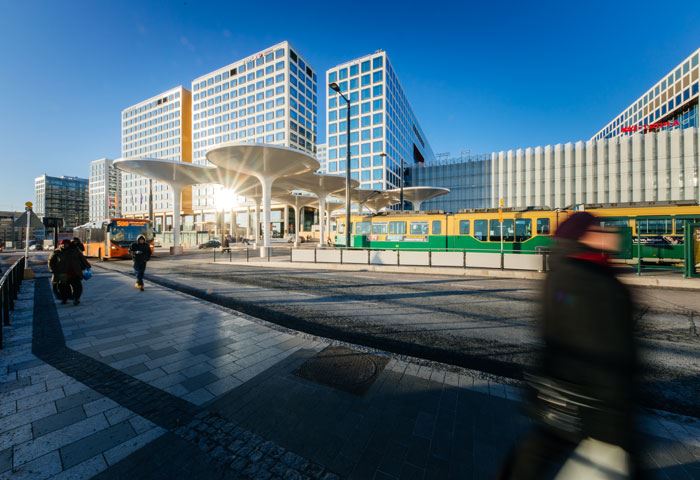Sustainable data centers as a service
Sokotel has extensive experience of hotel projects. The latest of them is Original Sokos Hotel Tripla, which opened for business in January 2020. The design and construction of the hotel involved close cooperation, and the early days of its operations have been a resounding success.
Owned by SOK, Sokotel is a hotel operator with two hotel brands currently in its portfolio. It operates a total of 26 Sokos Hotels and Radisson Blu hotels in three countries and six cities: Helsinki, Tampere, Vaasa, Oulu, St. Petersburg and Tallinn.
The global travel industry is growing at a rate of 3–4% per year. Sokotel also aims to achieve strong growth in the coming years.
“Hotel projects are long, so we need to apply a long time horizon of 10–20 years to our network planning to ensure the continuity of operations,” says CFO Jani Vahala from Sokotel.
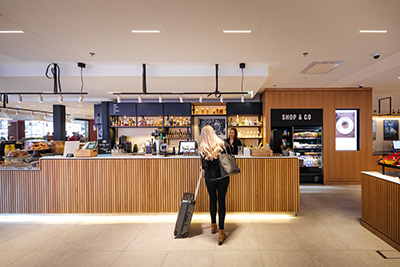
“Consumption is becoming increasingly individualised and people’s needs are growing increasingly diverse, and these trends are also reflected in the hotel industry,” Vahala points out.
Instead of hotel chains, the talk is now about chains of hotels that each have their own target customer group and profile. Customers have shifted from hunting for the lowest prices to seeking memorable experiences, which means that hotels need to be increasingly insightful in understanding the needs and wishes of their target group.
“In the future, hotel choices will be characterised by the customer’s personal priorities, such as being eco-friendly or building one’s own social media brand,” Vahala says.
The cooperation between Sokotel and YIT began in 2015 and Sokos Hotel Tripla opened for business on January 13, 2020.
When a hotel operator starts to make plans for a new hotel, location is the most important factor. Sokotel recognised Pasila’s advantages in that respect. The accessibility of the location was the first consideration, but the decision was also influenced by the tourism growth potential of Finland and the Helsinki metropolitan area. Pasila’s strengths were identified as the rapid development of the area and the investments made by the city. The appeal of the Tripla complex as a whole was also a positive factor.
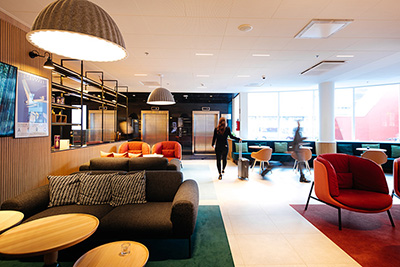
Thanks to attractions such as the Messukeskus Expo and Convention Centre, Hartwall Arena and Linnanmäki amusement park, the Pasila area has demand for event-related travel as well as tourism. Tripla and its services are an attractive destination for travellers as well as Helsinki metropolitan area residents who want to take a quick break from daily life. Business and conference travel, which primarily takes place during working weeks, is also a strong sector.
“Having guests who stay at the hotel during the working week complemented by weekend guests as well as seasonal guests is how we can achieve a high occupancy rate over time,” Vahala says.
“We decide to minimise our restaurant operations at the hotel and take advantage of Mall of Tripla’s broad range of food and beverage services. We needed large and adaptable conference and event facilities, and Tripla provided us with the opportunity for that.
Vahala is particularly satisfied by the fact that Sokotel was able to design the hotel’s layout together with the construction partner.
“We were involved right from the start, so our needs could be taken into consideration at every stage,” Vahala explains. The layout was developed together with YIT, taking the city’s requirements into account. The hotel has 430 rooms and a single-corridor layout, which represents an easy solution for customers and no wasted space from the hotel’s perspective. One of Sokotel’s requirements was that the premises needed to be flexible enough for use by business travellers, conference guests and families alike. The hotel’s story and identity took shape as progress was made in the design process.
“Our goal is to bring people together in various ways, and provide a warm accommodation experience without a stiff atmosphere,” Vahala adds.
Starting the cooperation between the hotel operator and the construction partner at an early stage makes it possible to make choices of materials that help create an excellent customer experience and support the hotel’s story and identity, but are also practical and easy to use from both the customer’s and the hotel’s perspective. Just as customers do not want to look for light switches or instructions for how to use the bathroom, floor attendants must also be able to work efficiently.
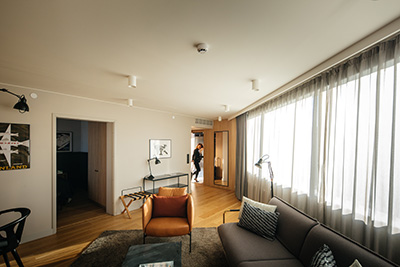
Hotel construction projects often involve challenges, but Vahala knows how to overcome them.
“You need to discuss everything openly as early as possible and work together in a proactive and consistent manner.”
Staying on schedule can be challenging for the constructor, but delays can be particularly damaging for the hotel, as accommodation services can be sold years in advance, or at least a year before the hotel actually opens. Construction work that is done after the hotel is open and work under the constructor’s warranty must also be carried out smoothly to minimise disruption to the hotel’s normal operations.
Original Sokos Hotel Tripla’s journey from design to implementation went smoothly and the hotel’s opening and early sales have exceeded Sokotel’s expectations. The hotel’s conference facilities are in high demand and the booking situation for the hotel’s rooms is good.
Vahala appreciates the construction partner’s solution-oriented approach, energy, proactivity and openness. He says the project was carried out in a professional and reliable manner. The feedback from customers has been positive:
“The Tripla project has been excellent from our perspective, both in terms of our cooperation with the constructor and the commercial success of the venture. The future looks bright,” Vahala concludes.
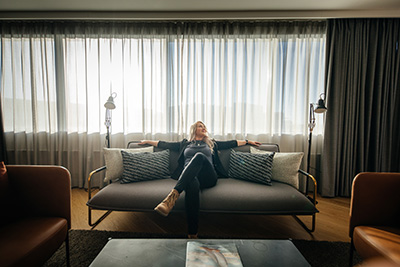
According to customer feedback, the positive aspects of the hotel include its location and transport connections, broad service offering, view, the stylish common areas, the tranquil atmosphere of the rooms, the lighting and the aesthetics of the bathrooms. Customers have also highlighted their satisfaction with how flows of people are managed on the conference floors.
The front desk area has been congested at times in the early stages, but the situation will be improved in the near future with the introduction of alternative check-in options, such as mobile check-in and self-service check-in machines.
P.S. If you visit the hotel, you may wonder why you can hear birdsong in the bathrooms. It is part of the hotel’s theme, which is Village, and it is linked to the blackbirds that live in the Pasila district. The song of the blackbird also inspired the background music played in the hotel’s corridors.
